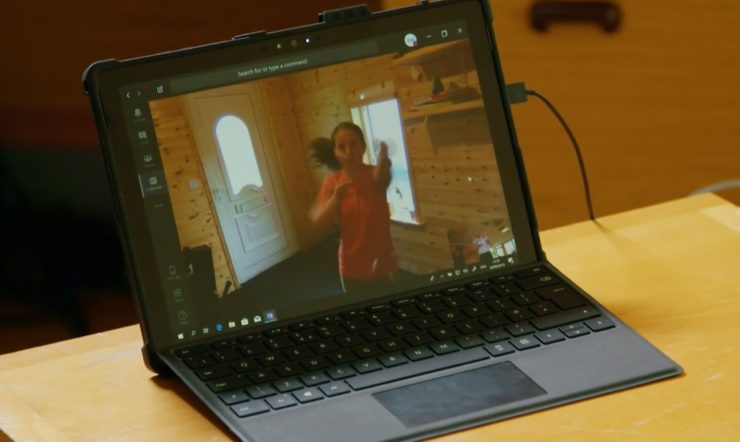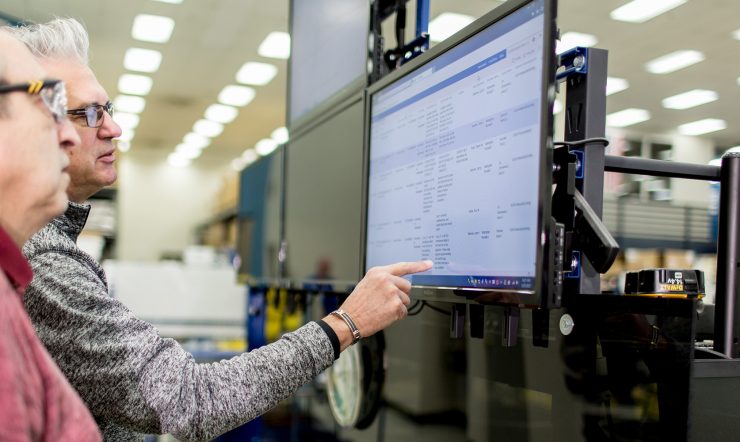It’s both an understatement and a cliché to say that things have changed in the last year. But while the one-year anniversary of the first lockdown isn’t something anyone will celebrate, the impact it has had on the way we work and learn is undeniable. We spoke to four higher education professionals from different institutions across Ireland to get their views on the effects of lockdown on education, what they have learned using Microsoft Teams, and what the future holds for hybrid learning spaces.
An Overnight Transition
Dr David Otway has long been an advocate for the integration of technology into academic learning. A chemistry lecturer, “digital learning enthusiast” and co-chair of the Academic Council Digital Education Advisory Group at University College Cork, he had been recording his lectures long before learning from home became the norm and was perhaps better prepared than many for the change. Still, when the UCC campus went into lockdown last March, his initial reaction was one of mild panic:
“My first thought was…how am I going to do this? Because I knew on Monday, I had to start teaching a group of 280 first-years.”
Having an archive of lectures recorded and ready to distribute seemed to offer a partial solution. Crucially, though, it was not one that allowed for the natural interactivity that lecturing live on Microsoft Teams would provide:
“I liked that I could immediately see the structure. I’m a sucker for visualisation. It was simple and intuitive. It worked.”
Thomas Smith, Language Centre Manager at Queen’s University Belfast was similarly struck by the sudden nature of lockdown, describing it as “coming down like a guillotine.” But despite the abruptness of the shift, the transition to working online with Microsoft Teams ended up being a surprisingly smooth one:
“I found it extremely intuitive. It just didn’t take any time. I didn’t have to tell people to go and do training or anything like that. It was a very seamless transition.”
Andrew Watters, lecturer in the Marketing and Business Computing department at Technological University Dublin similarly described the shutdown of the campus as “a shock to the system” and despite initial concerns that Microsoft Teams seemed more appropriate for business than education, he was impressed by the “fantastic updates” such as forms, whiteboard feature & breakout rooms that have been made to improve and optimise the platform for online learning.
For Bernard Goldbach, lecturer in Creative Media at the Limerick Institute of Technology the transition was a grassroots one, based on what was “in a sense, a mandate from the students” who were looking for a simple solution that would fit with the needs of their coursework:
“They [the students] said…for continuity, for consistency, use Teams. It was a request I was going to do anyway, but it was surprising to hear it from students.”
With confidence in the Microsoft ecosystem’s security and stability, Bernard was happy to proceed, noting that he found Microsoft Teams stable across the variety of devices, old and new, used by his students:
“It’s resilient in a way that’s trustworthy. I’ve lost nothing. It’s reliable even in sometimes challenging WIFI conditions.”
Making it Work
With reports indicating that hybrid home/office working has become a preference for many going forward, it shouldn’t come as a surprise that being forced into a year of learning from home has revealed some unforeseen advantages and opportunities.
Thomas Smith saw a rare opportunity for the Language Centre to reach a much larger audience in the sudden move to online learning:
“There was a lot of talk about how we could spend time during lockdown. Pick up an instrument? Read more? Develop a skill? And language learning was coming up a lot. I thought…there’s definitely something here. We have to lean into that.”
This thought led to the development of a new series of beginner’s courses, open to all called ‘Lockdown Language Learning.’ Creating a homepage to release and store weekly video learning materials, the course also allowed people to use a Microsoft Form to sign up for live interactive lecture sessions run via Microsoft Teams. With thousands of people soon accessing the materials, Thomas was left in no doubt that the demand for language learning during lockdown was there. But this was only the beginning.
When it comes to lectures and the collaborative classroom environment, Dr Otway (UCC) was surprised to find that the chat function added a layer of discussion during lectures that wouldn’t necessarily be possible to accommodate in the physical classroom:
“All of a sudden you’ve got this extra added dimension. It brings out a huge richness. I love the chat and how it worked.”
Using Microsoft Teams chat replaced email as Dr Otway’s primary means of communication with students, proving “hugely beneficial” as an immediate, easily accessible conversational tool. This experience was echoed by Bernard Goldbach (LIT), who enjoyed the natural “after class chat” feeling it created, comparing it favourably to naturally more formal structure of email. Creating what he called “huddle sessions”, he went further in encouraging students to converse and have “water cooler moments” that lockdown had taken away.
The social benefits of operating in an online environment were also surprising. Thomas Smith found that using Microsoft Teams led to “much more democratic”, less cliquey student interactions and the natural formation of an online community amongst students:
“It was as close to a social environment as we could achieve under the circumstances.”
Dr Otway (UCC) noted a similar experience with Microsoft Teams creating a kind of social equality within classroom collaboration, where more introverted students have had an easier time in classroom participation than they may have had in the campus setting.
For Andrew (TUD), building a level of socialisation has been key to his use of Microsoft Teams, particularly for newer students who have had the social side of college life taken from them. Simple things have made a difference in his effort to create a more approachable classroom atmosphere: encouraging students to get creative use GIFs, using custom backgrounds to prompt a laugh, or even taking advantage of breakout rooms to create smaller groups for projects. Above all, he has been particularly impressed by the way students have adapted:
“It’s so inspiring to see such a young generation coming in to such a change and just taking it in their stride.”
Bernard Goldbach (LIT), like Andrew, is interested in making the classroom environment as collaborative and interactive as possible using tools such as the Whiteboard and Forms within classes. But working with artists and designers, he has found that sometimes the most effective tool is one of the most fundamental. Many of his artist and designer students prefer to work on paper and simply display their work to the webcam to begin collaborative feedback sessions with the class:
“I just stand back, and it becomes a studio session. They want to talk and collaborate. It’s always a brilliant session when that happens.”
Recording lectures in Teams was something that has been found helpful across experiences, with each of them recording lectures or portions of lectures in some way for student reference. To Dr Otway (UCC) and Andrew (TUD), having the ability to simply record and upload lectures offered students in different life circumstances an equal opportunity to learn within their schedules. For Bernard, recording meetings has become a part of his curriculum, with students recording conversations to turn into podcasts and other materials for class credit.
What comes next?
With the vaccine rollout continuing across the island, there’s a sense of light at the end of the tunnel when it comes to the most severe lockdown restrictions. While there’s an obvious feeling of relief at the prospect of returning to campus and some version of normality, each of the professionals we spoke to agree that there has been a shift in attitude towards online learning that won’t be reversed.
Thomas Smith (Queens) sees the Lockdown Language Learning project as both a successful experiment and springboard for how the Language Centre can work with an increased online offering going forward:
“What we were missing was Microsoft Teams. All of our face-to-face tutors quickly became online tutors.”
Overall, Bernard (LIT) has found that although there has been more of a need for preparation and strict planning on his part, student learning hasn’t suffered and has, in fact, improved:
“The learning is probably better online, based on the dynamic classroom environment I’m trying to create. There’s no way I’m delivering less in this environment.”
He also notes that because of the distraction-free environment of the online classroom, classes have become more efficient: “I can do in three hours what I used to do in six.”
There are challenges ahead as we enter a hybrid campus/home teaching environment, but Dr Otway (UCC) feels prepared to meet them head on. Enthusiastic about the positive benefits online learning has had, he sees it as having had a seismic change in the way students will learn going forward:
“I don’t see it disappearing. It’s a disruptive and fundamental shift in education and in learning. We’re never going back to “normal” normal. I would hate to lose the level of connection, the contact, the engagement we’ve had.”
This feeling of change is echoed by Andrew (TUD), who sees organisations in education and beyond as needing to adapt in the wake of a year which has been an unexpected, but highly successful, experiment:
“You can deliver online, a very, very high standard class. Online works, and we’ve proven that it works. Teams has taken education out of lockdown.”
Find out how you can integrate Microsoft Teams into your education plans / classroom / campus here.


















